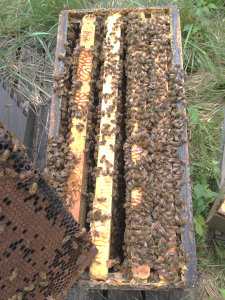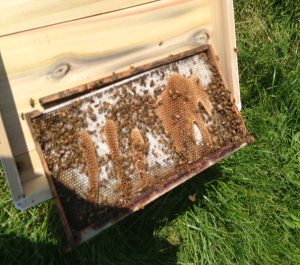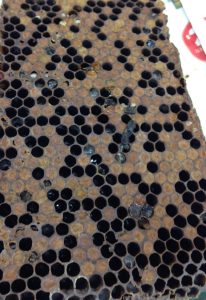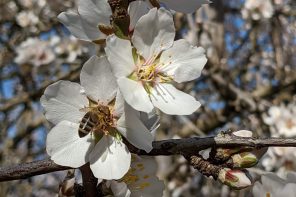When Considering the Purchase of Nucs
By: B. Worthy

Healthy nuc overflowing with bees.
Beekeepers have many options when deciding how to enlarge their apiary or add new genetics to their beekeeping records. One popular choice is to purchase nucs or nucleus colonies. You can buy a nuc from local beekeepers or other states; in fact, some serious beekeepers purchase queens from other states then sell nucs from those queens’ progeny. A common definition of a nucleus colony is a colony, or nuc, in a smaller hive, consisting of bees in all stages of development, as well as food, a laying queen and enough workers to cover three to five combs. When placed into a full-sized hive body and given supplemental feeding, the nuc should expand rapidly into a strong colony.
However, you will soon learn that “anything goes” as far as what is actually sold. Beekeeper complaints range from a box with one frame of brood and four frames of mixed plastic and wax foundation; frames with no foundation; ragged old black comb; no food stores; or a handful of bees with a sick looking queen. Some colonies used for pollination that are too weak to be transported forward are shaken out and scavenged so that the old black comb is sold to low bidders to use and sell as needed. Its “Business ROI” (Return on Investment). If the buyer of the final nuc complains, it is not perceived as a big deal, because meanwhile the seller has made a lot of money from their total sales. Other complaints include a queenless colony, a queen that is DOA or a cluster of laying workers. One person bought a nuc with a green drone frame in it!
The origin and history of the queen can vary from a strong queen with a pedigree of Winter hardiness and vigorous brood to a queen with unknown parentage or that of a second or third swarm. It could possibly be a queen from a state with vastly different climate conditions or one that was pushed for production and has not bred well. Prices vary significantly between “local” and “A.I.” (artificially inseminated) versus queens from other sources. The catch is knowing that you are paying for what you receive.
The buyers may assume that they are purchasing a queen from a local overwintered colony, but they are actually getting a queen from a package, from colonies used for pollination or a queen that was mass produced in another state. The nucs fail, then the beekeeper has spent a great deal of money for nothing or worse, introduced disease to their apiary. Meanwhile, time has passed with no colony(s) growing and producing.
The key to knowing from whom to buy and if the nuc(s) are worth the price, is to do a little homework- It’s worth the effort! Start by asking some basic questions and do some investigating. Ask other beekeepers from whom they bought nucs and how the colonies performed. Ask beekeepers who are not club members or work with the nuc producer. Ask the producer how many colonies and yards they have and how well they overwintered, or if the state (region) has an inspector, learn the size of the nuc producer’s operation. Reputable, serious queen/nuc producers recommend that one should have at least 40 colonies and at least two apiaries. Is the beekeeper or their apiaries registered with the state/region? How long has the beekeeper kept bees? Determine if the producer knows basic bee biology and has a solid varroa mite management program. How often does the producer monitor the colonies? What mite control products are used? Are the products from different chemistry families?

Frame of plastic foundation and “parallel comb” found in a nuc box.
Does the producer target the control strategy at the proper times or do they depend on vaporizing or other quick fixes? Are other products used to control pests that are not legal/labeled for use in beehives? Don’t get stuck buying sick or physically challenged colonies!
Does the producer know the requirements to raise healthy, fat queens? Each queen cell requires frames of young nurse bees and substantial quantities of nectar. Raising queens during a nectar flow is far superior to any other time of the season, despite the amount of syrup fed to the bees. What months were the queens made? If it has been cold and raining all Spring, the chance of producing enough quality queens to build nucs is highly unlikely. The queens have not had a chance to mate and the colonies have not grown enough to produce enough workers to feed and nourish queens. Someone selling nucs from overwintered queens in cool, wet Spring months is most likely supplementing with queens purchased from warmer states.
The more serious concern is introducing disease to your apiary. Experienced beekeepers caution that package bees should always be placed on foundation initially in case they have bacteria in their crops which is then deposited into drawn comb. When purchasing nucs, one can only hope that the nucs or colonies from which the nucs were made were inspected, but truthfully only a percentage of colonies are inspected and when multiple yards are involved, only a portion of the apiaries are inspected. Also, colonies that had been treated with an antibiotic may not show symptoms when they were inspected. In addition, frames from storage may be swapped into some nucs if needed that may contain bacterial spores or chemical residue.
It is important to know which yards and when the colonies were inspected and if possible, to purchase nucs from those yards. If not possible, make sure to inspect the nucs before purchasing them. Even if the lid is nailed or screwed down, or if weather is inclement, take the time to look at the frames and evidence of a brood pattern. It is sometimes hard to tell who the originator of the nucs is and how long that colony or nuc box has been around. Check and make sure that the colony is queenright and that all stages of healthy brood are present.
If you are buying a nuc with a purchased queen, she will be in a queen cage. You still need to have larvae and capped brood to care for the queen, as well as one to two frames of honey when she is released. If you are getting a nuc with its own queen, she should be loose in the nuc. If the queen is in a cage, leave the nuc and find another producer. Keep in mind that a locally produced queen in a nuc usually sells for a higher price than a purchased queen from another state. If the nuc contains a swarm caught recently or a month ago, the cost should be that of the box and value of the frames.

Frame with American
Foulbrood (AFB).
It is wise to place newly purchased nucs in a quarantine yard until they have cycled through two generations. Look at the larvae and developing brood. Are the larvae floating in royal jelly or dry? Do the larvae look dry, rubbery, brown or yellow? These are symptoms of European foulbrood and should be sent to a designated diagnostic laboratory. What do the pupae look like? Brown or sunken pupal cells can be symptoms of American foulbrood. Both can be found in purchased nucleus colonies and will cause chronic illness and heartache in the apiary.
Do the emerging bees look healthy? How prolific is the queen? Is her laying pattern normal? A strong nuc may need to be transferred to an eight or 10-frame within a week. Continue to monitor the colony(s), then if no disease is detected, the colony(s) can be moved to another yard.
Any colony can contract American foulbrood or European foulbrood at any time because the bacteria are always present on other bees, flowers, abandoned apiaries and the environment. Nucleus colonies made under stress or during poor weather are especially prone to EFB. Symptoms of PMS (parasitic mite syndrome) and other mite related illnesses often don’t show until later. The important point is monitor new colonies weekly or every two weeks and check all colonies monthly. Check the brood and make sure that the queen is healthy. If a problem arises, act, don’t wait for it to dissipate. Ask the inspector or an experienced, successful beekeeper for help.
Part of the fun in beekeeping is learning and growing but deceptions arise from those who are unprepared or too trustful in their beekeeper “friends” or club members and don’t learn how to protect themselves. Successful beekeepers are often tempted to sell nucs after a few years to keep their apiary size to a manageable level; others think that selling nucs will make them “easy money” and may not have a desire to sell a good product. Many don’t care because with 40% losses every year, the market is still great.
Visit their apiary and talk with them. If you can buy local nucs, do so but mainly buy nucs from beekeepers who have figured out how to successfully grow their colonies and have a sound management program. If you spend time with them and manage your own colonies well, you will soon be enjoying the sweet scent of success.
References
https://canr.udel.edu/maarec/nucleus-colonies/#:~:text=A%20nucleus%20colony%2C%20or%20nuc,five%20combs%20(Figure%2017).
https://edis.ifas.ufl.edu/publication/IN869
https://catalog.extension.oregonstate.edu/sites/catalog/files/project/pdf/pnw682_2.pdf








